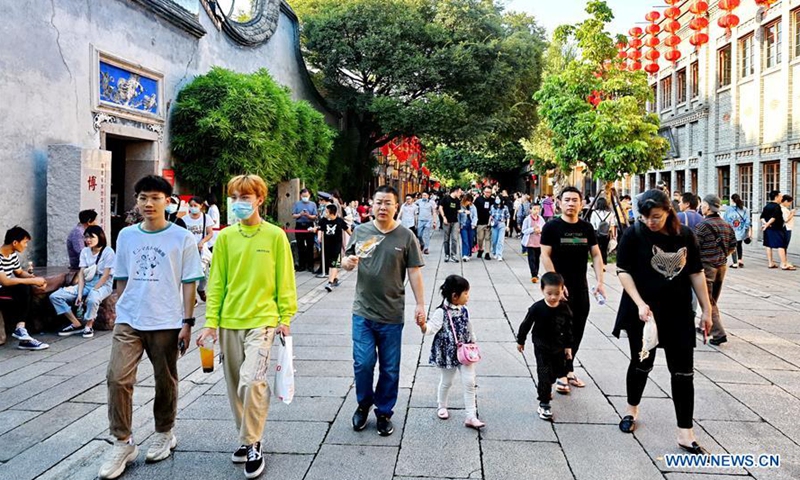SOURCE / INDUSTRIES
China planning to boost holiday consumption

Tourists visit Sanfangqixiang (Three Lanes and Seven Alleys), a scenic spot in Fuzhou, southeast China's Fujian Province, Oct. 8, 2020. According to Fujian Provincial Department of Culture and Tourism, Fujian received 39.3 million person-times of tourists during the eight-day National Day and Mid-Autumn Festival holiday ending on Thursday, marking a year-on-year increase of 5.5 percent. The province's tourism industry has raked in 34.09 billion yuan (about 5 billion U.S. dollars) in revenue during the holiday, up 10.2 percent from a year earlier.Photo:Xinhua
China will improve its holiday system, completely implement the paid leave system, and increase consumption during holidays, according to the full text of the proposals for the 14th Five-Year Plan (2021-25) for National Economic and Social Development and the Long-Range Objectives Through the Year 2035, which was released on Tuesday.
"Promoting consumption and expanding domestic demand requires consumers to have stable income expectations, a stable social security system, a sound market economy and economic development for the whole of society," Fu Yifu, senior researcher at the Suning Financial Research Institute, told the Global Times.
The sales volume for retail and catering enterprises in China reached 1.6 trillion yuan ($238.2 billion) during the National Day holidays from October 1 to 8, with the average daily sales rising by 4.9 percent compared with last year's golden week holiday, according to data from the Ministry of Commerce.
"If there had been no COVID-19, the average daily tourism revenue would have exceeded 100 billion yuan, as last year's National Day holiday revenue averaged more than 90 billion yuan per day. I suggest that China should restore the May Day golden week holiday, and increase the summer holidays in order to increase the scale of the holiday economy," Ye Qing, professor at the Zhongnan University of Economics and Law, told the Global Times on Wednesday.
Analysts suggested that China should focus on fostering new consumption growth points, actively develop industries such as cultural tourism, and continue to support the development of the night-time economy, including food, transportation, tourism, shopping and entertainment, so as to boost consumption in various areas.
The holiday economy is based on demand in culture and tourism. Demand is expected to increase, and the consumption experience for consumers will also be improved, Song Jia, director of the Innovation Center at the Research Institute of Machinery Industry Economic & Management, told the Global Times on Wednesday.
Holidays also include weekends and more cultural facilities in cities and towns can benefit, with new consumption scenarios likely to emerge, Song added.
Global Times
